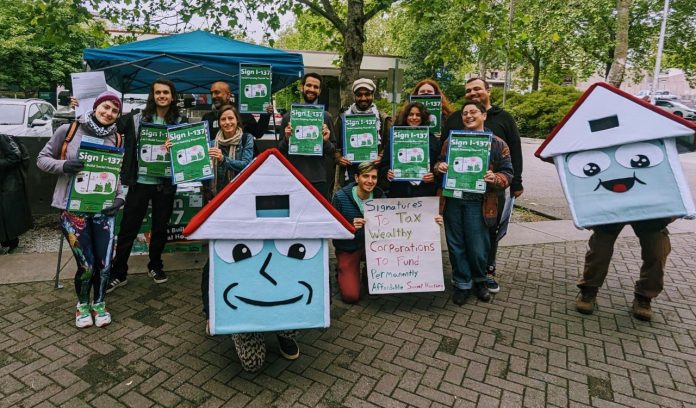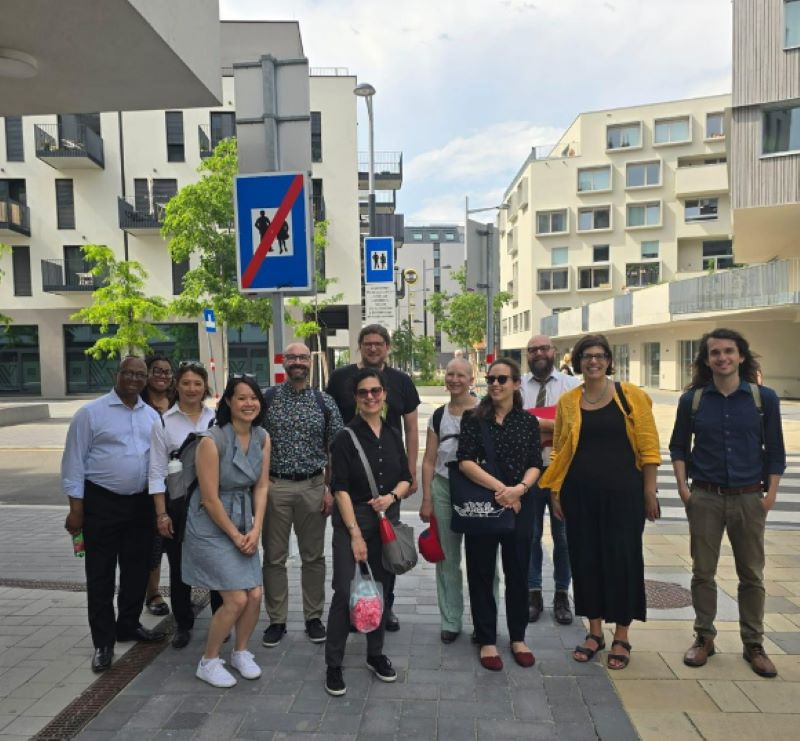
Late last month, backers of Initiative 137 announced that they have gathered enough voter signatures to qualify to send their social housing funding measure to Seattle voters. It will be up to the Seattle City Council to decide exactly when I-137 is on the ballot — and if a competing measure will appear alongside. Placing I-137 on the November presidential ballot or on a special February election remain options within the council’s discretion, as is passing the measure outright and skipping the ballot, which backers consider unlikely.
There is precedent for adding a dueling measure. In 2022, the council added ranked choice voting to the ballot alongside an astroturfed approval voting initiative funded largely by out-of-state mega-rich backers. Council’s ranked choice voting measure prevailed and now must be implemented by 2027.
In the case of I-137, council’s motivations could be different, with several members sharing skepticism that levying new taxes is necessary heading into a major budget deficit. Nonetheless, voters approved I-135 in a special election in February 2023, thereby establishing a social housing developer in Seattle with implied intent to fund it. The Urbanist Elections Committee (of which I am a member) endorsed I-135. Backers made it plain at the time that they intended to quickly pass a funding measure, but adding a funding source to the same measure would have run afoul of state prohibitions on dual subject ballot initiatives, which is why a second ballot measure was needed.
House Our Neighbors, which is the nonprofit leading the I-137 campaign, acknowledged the ballot timing decision before the council in their statement last month, but expressed confidence it’d pass no matter the timing. Even during a low-turnout, off-year special election in February, I-135 passed by a healthy 14-point margin.
“House Our Neighbors will be ready for whichever ballot I-137 is placed on,” the group said in a statement. “We know the Seattle City Council has a ton of work to do, especially with regards to the $260 million budget deficit, so we hope they quickly put I-137 on the November 2024 ballot. But we also know they can use the entire 45 days to consider their options, which would preclude the November ballot. Should I-137 be on a February ballot, we look forward to securing another win on a special election ballot, just like we did with the passage of I-135 by a 14 point margin.”
In an interview with The Urbanist, Tiffani McCoy, the policy and advocacy director of House Our Neighbors, pointed to the broad support their organizers and volunteers found while canvassing around the city, such as at farmers markets, festivals, and outside transit stations.
“We turned in over 38,000 signatures, and people were really supportive. People are really wanting to live in the city and worried about their ability to live in the city,” McCoy said. “There was an overwhelming support for taxing some of our richest businesses in Seattle to fund social housing, to fund expanded affordable housing. That was always a winner.”
I-137 needs 26,520 valid signatures to qualify, giving House Our Neighbors a big cushion as King County Election Office weeds through the submissions, verifying signatures and addresses.
McCoy noted that many Seattleites remembered the social housing measure and were intent on it succeeding.
“There were also a lot of voters, surprisingly, that remembered I-135 specifically the bonding capacity of the social housing developer,” McCoy said. “I’m not surprised they remembered social housing. That’s the hope with voter education, right? But the bonding part, they’re like, ‘Well, I thought, you know, that this would be able to do most of its acquisition and construction through bonding.'”
But bonding tends to require a dedicated funding stream or other collateral, which the Seattle social housing developer does not yet have. Hence the need for the funding stream that I-137 would provide, McCoy explained.
As a sort of millionaire’s tax, Initiative 137 would tax employee compensation in excess of $1,000,000 at a 5% rate on the portion over that million-dollar threshold, with stocks and bonuses included. House Our Neighbors projects that instituting such a tax in Seattle would generate roughly $53 million per year, with a small share set aside to pay for the City’s finance department to administer the tax. Unlike the City’s existing JumpStart payroll tax, grocery stores and health care companies would not be exempt.
The high earners payroll tax would allow the social housing developer to begin bonding and acquiring properties.
Chamber opposes social housing measure
Right out of the gates, the Seattle Metropolitan Chamber of Commerce has come out hard against I-137. In February, chamber president and CEO Rachel Smith called I-137 a “blank check” to an “unprepared” social housing developer.
“The replacement initiative, I-137, is another example of an approach that doesn’t serve Seattleites – and this time, it includes a blank check to be paid by residents of Seattle,” Smith said in a statement. “Sixty-five percent of voters do not trust the city of Seattle to spend tax dollars responsibly, and voters should be wary of supporting a ‘hypothetical business plan’ for a new, opaque, and seemingly unprepared governmental entity. Voters want more housing, not more housing entities.”
Recently, the chamber has also stressed the risk of companies relocating high-paid workers to avoid the tax.
“If passed, this would be the third increase to the city of Seattle’s payroll expense tax in three years, and coming at a time when downtown’s economy has not recovered and employers are making real decisions about where their employees work,” Smith told the Seattle Times last month.
The chamber has employed similar lines of argument to oppose increasing the size of the next city transportation levy to fund safety and mobility improvements, suggesting that Councilmember Tammy Morales didn’t do her homework before proposing to add an additional $150 million to the impending property tax measure.
McCoy saw the chamber’s opposition as reflecting progressive tax aversion in the business community and a desire to hoard wealth.
“It’s not surprising, because the chamber and the Downtown Seattle Association are opposed overwhelmingly to progressive revenue, to revenue that’s targeted those who have the most versus those who have the least,” McCoy said. “So it’s not a surprise. We have very few progressive revenue options in our state, and we wanted to make sure this was a progressive revenue option.”
Backers also contest the characterization of being ill-prepared. Along with the signature update, House Our Neighbors shared some progress on getting the Seattle Social Housing Developer (SSHD) up and running.
“Last Thursday, June 20th, at their monthly board meeting, the SSHD announced that ‘Candidate A’ was ready to sign the offer letter. This is a tremendous development,” House Our Neighbors said in a release. “The SSHD had been operating on IOU’s for the vast majority of their time as a Public Development Authority. Once the funds from the state started flowing to the SSHD, they immediately began the CEO hiring process. We are eager to get this money flowing to the SSHD to kickstart the agency, and begin the process of acquiring and building social housing communities.”
The Washington State Legislature provided the SSHD with startup funds this past session, allowing the fledgling authority to begin hiring, but it took receiving those funds to make the offer.
Counter-cyclical building could start to even out housing busts
Social housing proponents are poised to argue that the timing is ripe to ramp up social housing production. A basic reason is that the need for affordable housing is incredibly high, with many families severely rent-burdened. The high cost of housing also contributes to a weak social safety net for people who fall on hard times.
Another reason is that homebuilders have been warning that interest rates and other headwinds are creating a drag on housing production and that we could be headed into a prolonged slowdown or possibly a recession. New permit applications are down sharply. While rent growth moderated during the pandemic, the lack of new supply could send it skyrocketing again. A social housing developer offers a way to keep building homes even as private investment dries up during a slowdown and the low-income housing tax credits (LIHTC) that nonprofit builders rely on become more scarce and less able to cover project budgets.
“That’s what the Montgomery County, Maryland social housing portfolio, they call it a mixed-income portfolio, shows is that there is a dip in the private market production,” McCoy said. “There’s a dip in housing starts even in LIHTC projects and others, just because of inflation and construction costs, but they are continuing to be able to pump money into this mixed-income portfolio. Because housing is a public good they’re able to use this revolving loan fund, and it’s just always about producing the housing.”

The 2008 housing crash was followed by several years of anemic housing production, which laid the seeds for the housing shortages and rapid price spikes many growing cities have seen over the last decade. Smoothing out those busts has been a goal of policymakers for a long time. McCoy pointed to research that found housing slowdowns were less severe in cities with a robust social housing sector, such as Vienna and Singapore.
“We see that in a longitudinal study between Ireland and Vienna during the 2008 crash, and then Singapore versus Hong Kong,” McCoy said. “So yes, this is something that we can be doing if we’re treating housing as a public good, and that’s something that social housing provides.”
By this winter, Seattle voters will have before them the question of whether to fund such a social housing approach and take a step toward being a bit more like Vienna or Singapore.
Correction: An earlier version of this article incorrectly stated the Seattle Chamber opposed I-135. In fact, they were neutral. We apologize for the error.
Doug Trumm is publisher of The Urbanist. An Urbanist writer since 2015, he dreams of pedestrian streets, bus lanes, and a mass-timber building spree to end our housing crisis. He graduated from the Evans School of Public Policy and Governance at the University of Washington in 2019. He lives in Seattle's Fremont neighborhood and loves to explore the city by foot and by bike.

